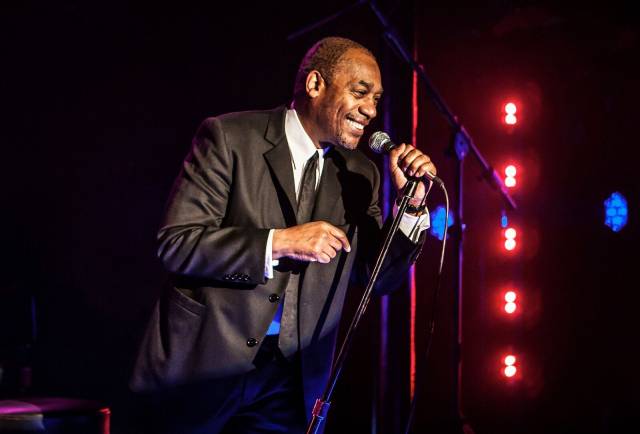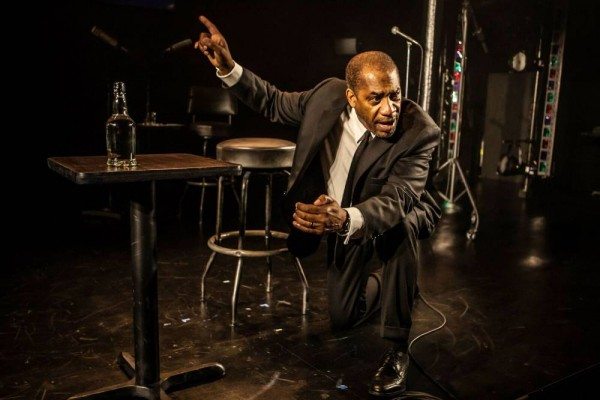

Whether someone is a Broadway watcher, or a TV or film buff, you have likely seen actor Joe Morton craft his characterizations, often with far more depth than the roles required. His early years found him cast in one Broadway show after another, starting with the landmark musical Hair.
However, Mr. Morton’s breakout role was unquestionably the lead in the John Sayles film Brother From Another Planet (1984), which made him a household name in the art house film world. Then came decades of nearly constant work in films and TV. While there have been many successes along the way, his last few years on the hit TV show Scandal have put him front and center and rewarded him with an Emmy.
His latest project brings him back to the New York stage in Turn Me Loose, a new play based on the life of comic/activist/entrepreneur Dick Gregory. In this essentially one-man show, Morton gets to flex some of his most serious talents, across two hours that bring the audience from laughs to tears, and back again.
I want to start by saying I saw last night's performance and it was just fabulous, thank you so much.
Joe Morton: You're most welcome, thank you.
I'm a long time fan of your work going back to Brother from Another Planet, and in the interim I may have missed some of things you have done. I checked and saw a long list of projects over the years. So I'm curious, finding homes like Eureka and Scandal seem to be a hard thing to do no matter how talented and prolific an actor is. How have those projects changed your career and other aspects of your life?
Well with Eureka, that happened at a time when I was going though a very lengthy divorce, I needed to find a job that was going to pay the bills, so Eureka came along and literally...one of the things an actor has to do is make choices about why they take a certain job. And Eureka was about money, they paid me a lot of money to do that, and I thought "terrific".
But what then began to develop was, it was sort of making lemonade out of lemons. I directed on that show, I had art on it -- I used to do a lot of abstract photography, so the art work that was on the walls was mine. I wrote music and sang on the show. So in a way it was very educational.
I started to use a lot of other parts of myself in that show, which was very instructive and made me appreciate the show even more. I became more and more involved. So that tended to be a tremendous and terrific series. And for a while we were number one on the network, which was gratifying.
With Scandal, it was...well I had spent most of my career playing good guys because when I started in this business in the late '60s a lot of the film characters for black male actors were untoward, you know, drug dealers, pimps and bugaboos of one sort or another. And you know, I just thought, that's not for me, so let me see if I can do something else. So I had a diverse portfolio, if you will, of characters that did other kinds of things.
But then I went out to LA three or four years ago, had not seen Scandal, but knew about it. Knew about Kerry Washington, watched Scandal, fell in love with it and thought to myself, I wonder if there's a way I can get on that show, just in a maybe a two or three episode arc story-line kind of thing. But before I had an opportunity to talk to my agent or manager about it, I got a call from them saying ABC is interested in talking to you about getting into Scandal. What made me say yes, was when I spoke to the producer I had a secret I had to keep. That at the end of that season, it would be revealed in the last two lines of the very last episode, that I was Olivia's dad. So I said, "I'm in."
Though you don't really look old enough to be her dad. Older love interest, yes, but not quite her dad. Anyone that watches your film or TV work can tell you come from the stage. In fact you worked with one of my oldest friends, Michael Valenti, who composed the music for two of the Broadway shows you did, Oh, Brother! and Honky Tonk Nights.
Yes, of course.
In the interim years, did you get to do much stage, perhaps out in LA? Or is Turn Me Loose something of a fresh return to the stage for you?
No, not out in LA unfortunately. But I have been trying to return to the stage as often as I could. The difficulty with this business is that I do believe that theater is the hardest of the three mediums -- theater, TV and film. But it pays the very least, so it's a difficult thing to do unless it happens like this, while on hiatus. This particular project is an important play. It's a message that people need to hear, but I've done Stuff Happens in London, played Colin Powell in that play. That was the premiere of that play. I did ART on Broadway, I did Exonerated Off-Broadway. So as often as I've had an opportunity to come back to the stage, I have. It's just a matter of scheduling, mostly.

How did Turn Me Loose come about? You just mentioned it's an important play. Many of us know of, but don't know as much about Mr. Gregory as we should.
Right, and I think it delivers a call to action that not many plays today do. It talks about income disparity, it talks about racism, it talks about corporate greed, nutrition...and in its humor it talks about taxes, it talks about all kind of things I think the audience is only somewhat prepared for. And in a lot of cases, they may go home and do further research on who Dick Gregory is. So the way that it came about, my manager happened to talk to the gentleman that was casting it. They were putting a list together of people that might be interested in doing the play and my manager said, "I think I've solved you problem for you," gave them my name and we were off to the races.
The script, it seems like large parts were taken from actual speeches, performances and recordings. But some of the more intimate moments that didn't fall into that area, did they come from Mr. Gregory himself, or from his writing?
I think the intimate parts just came from the author, Gretchen Law, who really just got into his mindset and was able to come up with some wonderful psychological material. Like the dressing room scenes, but specifically the death of his son. Dick never speaks about that, and said that on opening night, "I never talk about that to anyone, or publicly."
So the first time he saw the play, which was actually opening night, he said he spent most of that time, while I talked about the death of this son, he spent looking at his wife Lil to see her response to it, because again, this was something that was not out in the public. So again, it is a very visceral kind of piece on all kinds of levels.
There was that great scene in the play where Mr. Gregory turns down Jack Paar's invitation to perform on the Tonight Show -- practically hanging up on him. Did it actually happen that way?
Well, he did turn down Jack Paar. That came out of a conversation he had with Billy Eckstine. He and Billy were watching Jack one night and Billy said, "I really don't like this show." Dick had been watching it for years and asked why. "Because the black performers never get to sit down with Jack after they perform, and talk with the audience." And from that point on, Dick said he was stunned at the fact that he hadn't realized after watching it for years, that black performers weren't given the opportunity to sit on the couch. So that did happen. Whether it happened on a phone call or not, but that moment did happen.
Doing my own due diligence, I tried to find some classic footage of Mr. Gregory. But the vast majority was of him in the last decade or so, as an older man. Almost nothing of him from years before, perhaps a couple of recordings. Being that most of us don't have that reference point of, "that's what he looked like, or sounded like, or moved like," how important was it to you to get that part of the character down?
It was very important. I listened to a lot of his recording and I guess, listened to it in a slightly different way. First I listened to the material. But then I went and listened again to him in night clubs, he had been drinking in those days. I went back and listened to his very last performance, you only see a photo on YouTube, but you can hear him speaking.
There's also a tape of him giving a press conference when he became a write-in candidate for President in 1968. Which is really interesting. The interview scene that is in the play, you can actually find that on YouTube as well. As a matter of fact I found that there and gave it to Gretchen, which is how it got into the play.
There was just enough of him as a young man for me to kind of put that together. And as you say, correctly, there is a great deal of him as an older man.
I have to ask, how much coffee to you need to have before going on? The energy that you put out is just....I don't know how you get through the week.
I think the way I need to look at this is like running a marathon. I have to be very aware of preserving my energy during the week. Actually, I don't drink coffee. I did during early rehearsals, which were out in California. When we started this I was doing a little bit of double duty. I was rehearsing the play on my days off, and going to the studio when I had to work. And trying to learn both things at the same time when I'm home alone in the house.
I've been lucky to always have energy, and learning to breathe so I can make it through two shows in a day. And breathe through all of it so I can stay fresh and alive in every performance.
It's a uniquely demanding show. Thank you again, I enjoyed it thoroughly.
Thank you so much, I really appreciate it.
Performances of "Turn Me Loose" continue at the Westside Theatre through July 3.